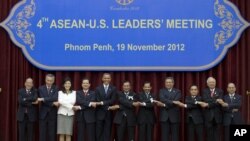PHNOM PENH - Senior US officials and experts on Southeast Asia and human rights met in Washington on Wednesday, in a closed-door symposium to discuss Asean’s new Declaration of Human Rights, which many say falls short of international standards and could allow authoritarian regimes room to crack down on dissent.
The discussion included human rights and democracy advocates from around Southeast Asia and the US and was held with US Assistant Secretary of State Daniel Baer, who oversees the office concerned with labor, human rights and democracy. Reporters were allowed to sit in on the symposium, but not to quote directly from it.
Pek Koon Heng, director of the Asean Studies Center at American University, in Washington, organized the discussion, officially called The United States-Asean Symposium on the Asean Declaration on Human Rights. She told VOA Khmer the purpose was to “educate the Washington-based community” about the processes of Asean and how they typically progress.
“The fact is now we have NGOs pushing very hard” in the region, she said. “It’s very good. Ten years ago, we didn’t have this, and now we do. It is good to understand the Asean ways, and how things can be reached slowly—but we get there.”
Asean leaders passed the declaration at a summit in Cambodia earlier this month, but speaking on the sidelines of Wednesday’s discussion, many rights advocates said room for improvement remains.
“I think this is a very dangerous path,” said Robert Herman, regional programs head at Freedom House, a US-based watchdog group, which sponsored Wednesday’s symposium along with the State Department and the Asia Foundation. However, he said, the declaration is a “living document… so I think there will be continued push and emphasis by civil societies to strengthen this document to use it and to improve it.”
Amitav Acharya, who chairs American University’s Asean Studies Center, said a declaration did not guarantee the elimination of rights abuses.
“My sense is that we are not going to see human rights violations in Asean disappear anytime soon, whether there is a declaration or not a declaration, mainly because the governments are not democratic in many cases,” he said. There are strong correlations between rights abuses and authoritarian governments, he said. “To protect human rights, you need to have a government that is willing and able to do so,” he said, “a legitimate, elected, democratic government that respects human rights.”
Supporters of the declaration amid the governments of Southeast Asia say it will reenforce already existing commitments to international human rights practices. But rights advocates have said they are worried about vague language in the document, especially regarding national security and public order, that would allow despotic regimes to hamper basic freedoms, especially those of speech and assembly.
In a statement last week, the US State Department said it was “deeply concerned” that the declaration “could weaken and erode universal human rights and fundamental freedoms.”
However, some rights groups say that having some kind of document is better than having nothing at all.
“We welcome it actually,” said Irene Fonacier-Fellizar, an adviser to the UN on violence against children in the Philippines. “Because we can begin working, we can begin identifying exactly how much more improvement, and in terms of our Asean cultures, we would be able now to put in writing what we now understand.”
The declaration will continue to be criticized by civil society, but as a means to improve it, she said. “We are not criticizing to destroy,” she said. “We are criticizing because we want to do better.”








